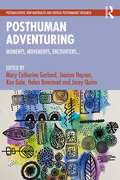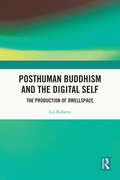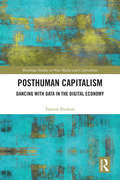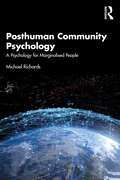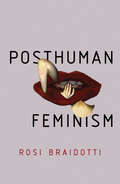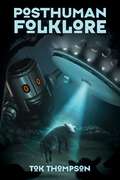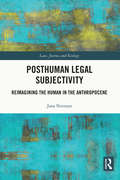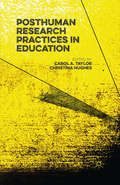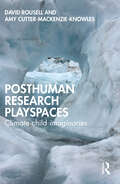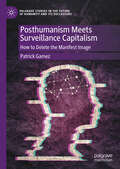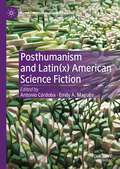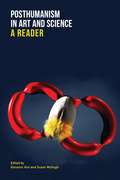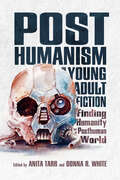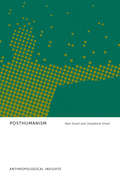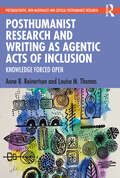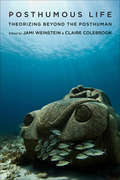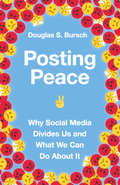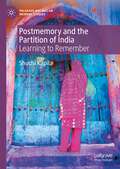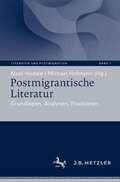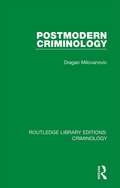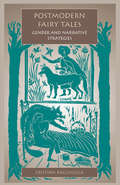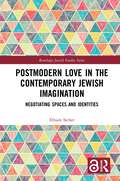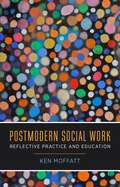- Table View
- List View
Posthuman Adventuring: Moments, Movements, Encounters... (Postqualitative, New Materialist and Critical Posthumanist Research)
by Joanna Haynes Ken Gale Jocey Quinn Helen Bowstead Mary Catherine GarlandPosthuman Adventuring immerses readers in a transdisciplinary methodology that merges images and sounds to inspire ongoing dialogue and provoke imaginative inquiry. Through a compilation of thought‑provoking chapters, this book connects readers to original presentations by renowned posthuman thinkers and offers responses from various authors.This collection showcases groundbreaking posthuman research conducted by scholars, artists, community‑based practitioners, and doctoral students across diverse contexts, spanning from forced migration to intergenerational relationships, from plants to bears, and from collective writing to reimagining social structures. With its experimental practices and transformative encounters, this unique anthology encourages readers to embark on their own intellectual adventures and cultivate fresh concepts. Emphasizing the fluidity and emergence of ideas, this book features chapters written by individuals and collaborative groups, each opening new spaces of inquiry and experimentation. The range of topics covered is vast, drawing inspiration from unexpected sources such as crochet blankets, women’s football, trauma within Canadian residential schools, sketchbooks, postverbal learning in dementia, and preschool outings in Johannesburg. This book invites readers to speculate, make connections, and invent their own concepts while showcasing the ongoing actualization of ideas.Ideal for scholars of posthumanist thinking across the social sciences.
Posthuman Buddhism and the Digital Self: The Production of Dwellspace
by Les RobertsIn Posthuman Buddhism and the Digital Self, Les Roberts extends his earlier work on spatial anthropology to consider questions of time, spaciousness and the phenomenology of self. Across the book’s four main chapters – which range from David Bowie’s long-standing interest in Buddhism, to street photography of 1980s Liverpool, to the ambient soundscapes of Derek Jarman’s Blue, or to the slow, contemplative cinema of Tsai Ming-Liang – Roberts lays the groundwork for the concept of ‘dwellspace’ as a means by which to unpick the shifting spatial, temporal and experiential modalities of everyday mediascapes. Understood as a particular disposition towards time, Roberts’s foray into dwellspace proceeds from a Pascalian reflection on the self/non-self in which being content in an empty room vies with the demands of having content in an empty room. Taking the idea of posthuman Buddhism as a heuristic lens, Roberts sets in motion a number of interrelated lines of enquiry that prompt renewed focus on questions of boredom, distraction and reverie and cast into sharper relief the psychosocial and creative affordances of ambience, spaciousness and slowness. The book argues that the colonisation of ‘empty time’ by 24/7 digital capitalism has gone hand-in-hand with the growth of the corporate mindfulness industry, and with it, the co-option, commodification and digitisation of dwellspace. Posthuman Buddhism is thus in part an exploration of the dialectics of dwellspace that orbits around a creative self-praxis rooted in the negation and dissolution of the self, one of the foundational cornerstones of Buddhist theory and practice.
Posthuman Capitalism: Dancing with Data in the Digital Economy (Routledge Studies in New Media and Cyberculture)
by Yasmin IbrahimPosthuman Capitalism critically reviews the manifestation of capitalist agenda online by examining the phenomenon of the ‘posthuman’ in the data economy. The chapters examine our posthuman condition, where we are constantly asked to partake in platforms which perform to capitalist agenda while socializing us into new platforms of living, consuming and interacting online. Labelling these modes of our experiential extractions, transactions and re-making of our mortal lives as posthuman capitalism, the book reviews the human entanglements from sociality, friendship, desire, memory, transgressions of privacy and co-production of value through the data economy. Offering innovative and interdisciplinary conceptualisations and vantage points on our contemporary data society, this book will be a key text for scholars and students in the areas of digital media, communication studies, sociology, philosophy and social psychology.
Posthuman Community Psychology: A Psychology for Marginalised People
by Michael RichardsPosthuman Community Psychology is an exploration of mainstream psychology through a critical posthumanity perspective, examining psychology’s place in the world and its relationship with marginalised people, with a focus on people with disabilities. The book argues that the history of modern psychology is underpinned by reductionism and individualism, which is embedded within the contemporary psychology that we know today despite the challenges from critical and community psychologists who seek a more empowering, inclusive, and activist psychology. The posthuman community psychology ideas that emerge in this book examine and intersect with mainstream psychology, critical and community psychologies, critical posthumanities and disability studies to propose an imaginative, reflective, and relational new psychology that represents a collection of possibilities that do not remain entrenched in older ways of thinking about humans and human connections. Richards proposes that psychology has the potential to evolve and make a powerful and profound difference for marginalised people, but a genuine desire for change from psychologists is essential for this to happen. Illustrating the important considerations needed when examining the relationship between the discipline of psychology and marginalised people, this book is fascinating reading for community psychology students and academics, aspiring professional psychologists, community workers, and policy makers.
Posthuman Feminism
by Rosi BraidottiIn a context marked by the virulent return of patriarchal and white supremacist attitudes, a new generation of feminist activists are continuing the struggle: these are very feminist times. But how do these and other movements relate to the contemporary posthuman condition? In this important new book, Rosi Braidotti examines the implications of the posthuman turn for feminist theory and practice. She defines the posthuman turn as a convergence between posthumanism on the one hand and post-anthropocentrism on the other, and she examines their complex relationship and joint impact. Braidotti claims that mainstream posthuman scholarship has neglected feminist theory, while in fact feminism is one of the precursors of the posthuman turn, through diverse social movements and political traditions. Posthuman Feminism is an analytic and creative response to contemporary conditions and a call to action. It highlights the constraints but also the potentialities available to feminist political subjects as they confront the ever-growing injustices of sexism, racism, ecocide and neoliberal capitalism. This bold new text by a leading feminist philosopher will be of great interest to students and scholars throughout the humanities and social sciences.
Posthuman Folklore
by Tok ThompsonCan a monkey own a selfie? Can a chimp use habeas corpus to sue for freedom? Can androids be citizens? Increasingly, such difficult questions have moved from the realm of science fiction into the realm of everyday life, and scholars and laypeople alike are struggling to find ways to grasp new notions of personhood. Posthuman Folklore is the first work of its kind: both an overview of posthumanism as it applies to folklore studies and an investigation of “vernacular posthumanisms”—the ways in which people are increasingly performing the posthuman. Posthumanism calls for a close investigation of what is meant by the term “human” and a rethinking of this, our most basic ontological category. What, exactly, is human? What, exactly, am I? There are two main threads of posthumanism: the first dealing with the increasingly slippery slope between “human” and “animal,” and the second dealing with artificial intelligences and the growing cyborg quality of human culture. This work deals with both these threads, seeking to understand the cultural roles of this shifting notion of “human” by centering its investigation into the performances of everyday life.From funerals for AIBOs, to furries, to ghost stories told by Alexa, people are increasingly engaging with the posthuman in myriad everyday practices, setting the stage for a wholesale rethinking of our humanity. In Posthuman Folklore, author Tok Thompson traces both the philosophies behind these shifts, and the ways in which people increasingly are enacting such ideas to better understand the posthuman experience of contemporary life.
Posthuman Legal Subjectivity: Reimagining the Human in the Anthropocene (Law, Justice and Ecology)
by Jana NormanThis book provides a reimagining of how Western law and legal theory structures the human–earth relationship. As a complement to contemporary efforts to establish rights of nature and non-human legal personhood, this book focuses on the other subject in the human–earth relationship: the human. Critical ecological feminism exposes the dualistic nature of the ideal human legal subject as a key driver in the dynamic of instrumentalism that characterises the human–earth relationship in Western culture. This book draws on conceptual fields associated with the new sciences, including new materialism, posthuman critical theory and Big History, to demonstrate that the naturalised hierarchy of humans over nature in the Western social imaginary is anything but natural. It then sets about constructing a counternarrative. The proposed ‘Cosmic Person’ as alternative, non-dualised human legal subject forges a pathway for transforming the Western cultural understanding of the human–earth relationship from mastery and control to ideal co-habitation. Finally, the book details a case study, highlighting the practical application of the proposed reconceptualisation of the human legal subject to contemporary environmental issues. This original and important analysis of the legal status of the human in the Anthropocene will be of great interest to those working in legal theory, jurisprudence, environmental law and the environmental humanities; as well as those with relevant interests in gender studies, cultural studies, feminist theory, critical theory and philosophy.
Posthuman Research Practices in Education
by Carol A. Taylor Christina HughesHow do we include and develop understandings of those beyond-the-human aspects of the world in social research? Through fifteen contributions from leading international thinkers, this book provides original approaches to posthumanist research practices in education. It responds to questions which consider the effect and reach of posthuman research.
Posthuman Research Practices in Education
by Carol A. Taylor Christina HughesHow do we include and develop understandings of those beyond-the-human aspects of the world in social research? Through fifteen contributions from leading international thinkers, this book provides original approaches to posthumanist research practices in education. It responds to questions which consider the effect and reach of posthuman research.
Posthuman research playspaces: Climate child imaginaries
by Amy Cutter-Mackenzie-Knowles David RousellPosthuman research playspaces: Climate child imaginaries addresses the need for new forms of climate change education that are responsive to the rapidly changing material conditions of children’s socioecological worlds. The book provides a comprehensive understanding of how posthumanist concepts and methods can be creatively developed and deployed in collaboration with children and young people. It connects climate change education with posthumanist studies of childhood in the social sciences and environmental humanities. It also offers opportunities for readers to encounter new theoretical and methodological approaches for collaborative art, inquiry, and learning with children. Drawing on three years of participatory research undertaken with 135 children in the Climate Change and Me (CC+Me) project, it takes children’s creative and affective responses to climate change as the starting point for the co-production of knowledge, community engagement, and the transformation of pedagogy and curriculum in schools. Thinking through process philosophy, and in particular, the works of Whitehead and Deleuze, the book develops new concepts and methods of creative inquiry which situate children’s learning, aesthetic production, and theory-building within a more-than-human ecology of experience. The book presents a series of generative openings and propositions for future research in the field of climate change education, while also offering wide-ranging applications for graduate students and researchers in childhood and youth studies, the environmental arts and humanities, cultural studies of science and technology, educational philosophy, and environmental education.
Posthumanism Meets Surveillance Capitalism: How to Delete the Manifest Image (Palgrave Studies in the Future of Humanity and its Successors)
by Patrick GamezThe core contention of this book is that, when viewed through the lens of contemporary posthuman theory, contemporary uses of AI under platform capitalism not only undermine our sense of the &“human&” but also our frameworks for conceptualizing ourselves as &“subjects&” or &“selves&” at all. This radical conclusion raises issues forces us to reckon with a new, disorienting horizon for critical thought at the intersection of technology and politics. This book demonstrates that two major streams of posthuman thought—namely, accelerationism and Prometheanism—can be interpreted as attempts to liberate our desires from our reason or our rationality from our all-too-human desire, each through the offloading of various tasks to emerging technologies. But, Patrick Gamez argues, the rise of opaque, unexplainable machine learning algorithms to predict and shape our behaviour undermines the common-sense models of mind through which we ultimately make sense of both the human and the posthuman.
Posthumanism and Latin (Studies in Global Science Fiction)
by Emily A. Maguire Antonio CórdobaThis volume explores how Latin American and Latinx creators have engaged science fiction to explore posthumanist thought. Contributors reflect on how Latin American and Latinx speculative art conceptualizes the operations of other, non-human forms of agency, and engages in environmentalist theory in ways that are estranging and open to new forms of species companionship. Essays cover literature, film, TV shows, and music, grouped in three sections: “Posthumanist Subjects” examines Latin(x) American iterations of some of the most common figurations of the posthuman, such as the cyborg and virtual environments and selves; “Slow Violence and Environmental Threats” understands that posthumanist meditations in the hemisphere take place in a material and cultural context shaped by the catastrophic destruction of the environment; the chapters in “Posthumanist Others” shows how the reimagination of the self and the world that posthumanism offers may be an opportunity to break the hold that oppressive systems have over the ways in which societies are constructed and governed.
Posthumanism in Art and Science: A Reader
by Aloi, Giovanni; McHugh, SusanPosthumanism synthesizes philosophical, literary, and artistic responses to technological advancements, globalization, and mass extinction in the Anthropocene. It asks what it can mean to be human in an increasingly more-than-human world that has lost faith in the ideal of humanism, the autonomous, rational subject, and it models generative alternatives cognizant of the demands of social and ecological justice. Amid rising social justice movements, collapsing economic structures, and the dwindling power of cultural institutions, posthumanism advances thinking on new and previously unenvisionable challenges.Posthumanism in Art and Science is an anthology of indispensable statements and artworks that provide an unprecedented mapping of this intellectual and aesthetic development in a global context. It features groundbreaking theorists including Donna Haraway, Rosi Braidotti, Mel Y. Chen, Michael Marder, Alexander Weheliye, Anna Tsing, Timothy Morton, N. Katherine Hayles, Bruno Latour, Francesca Ferrando, and Cary Wolfe, as well as innovative, influential artists and curators such as Yvonne Rainer, Skawennati, Chus Martínez, William Wegman, Nandipha Mntambo, Cassils, Pauline Oliveros, and Doo-sung Yoo. These provocative and compelling works, including previously unpublished interviews and essays, speak to the ongoing conceptual and political challenge of posthumanist thinking in a time of unprecedented cultural and environmental crises.An essential primer and reference for educators, students, artists, and art enthusiasts, this volume offers a powerful framework for rethinking anthropocentric certitudes and reenvisioning equitable and sustainable futures.
Posthumanism in Young Adult Fiction: Finding Humanity in a Posthuman World (Children's Literature Association Series)
by Anita Tarr and Donna R. WhiteContributions by Torsten Caeners, Phoebe Chen, Mathieu Donner, Shannon Hervey, Angela S. Insenga, Patricia Kennon, Maryna Matlock, Ferne Merrylees, Lars Schmeink, Anita Tarr, Tony M. Vinci, and Donna R. White For centuries, humanism has provided a paradigm for what it means to be human: a rational, unique, unified, universal, autonomous being. Recently, however, a new philosophical approach, posthumanism, has questioned these assumptions, asserting that being human is not a fixed state but one always dynamic and evolving. Restrictive boundaries are no longer in play, and we do not define who we are by delineating what we are not (animal, machine, monster). There is no one aspect that makes a being human—self-awareness, emotion, artistic expression, or problem-solving—since human characteristics reside in other species along with shared DNA. Instead, posthumanism looks at the ways our bodies, intelligence, and behavior connect and interact with the environment, technology, and other species. In Posthumanism in Young Adult Fiction: Finding Humanity in a Posthuman World, editors Anita Tarr and Donna R. White collect twelve essays that explore this new discipline's relevance in young adult literature. Adolescents often tangle with many issues raised by posthumanist theory, such as body issues. The in-betweenness of adolescence makes stories for young adults ripe for posthumanist study. Contributors to the volume explore ideas of posthumanism, including democratization of power, body enhancements, hybridity, multiplicity/plurality, and the environment, by analyzing recent works for young adults, including award-winners like Paolo Bacigalupi's Ship Breaker and Nancy Farmer's The House of the Scorpion, as well as the works of Octavia Butler and China Miéville.
Posthumanism: Anthropological Insights (G - Reference, Information and Interdisciplinary Subjects)
by Alan Smart Josephine SmartDesigned to explain posthumanism to those outside of academia, this brief and accessible book makes an original argument about anthropology's legacy as a study of "more than human." Smart and Smart return to the holism of classic ethnographies where cattle, pigs, yams, and sorcerers were central to the lives that were narrated by anthropologists, but they extend the discussion to include contemporary issues like microbiomes, the Anthropocene, and nano-machines, which take holism beyond locally bounded spaces. They outline what a holism without boundaries could look like, and what anthropology could offer to the knowledge of more-than-human nature in the past, present, and future.
Posthumanist Research and Writing as Agentic Acts of Inclusion: Knowledge Forced Open (Postqualitative, New Materialist and Critical Posthumanist Research)
by Louise M. Thomas Anne B. ReinertsenPosthumanist Research and Writing as Agentic Acts of Inclusion: Knowledge Forced Open looks at the true value and possibilities of 'learning' and knowledge within the emerging field of New Public Governance by examining, through a posthumanist lens and other perspectives, the paradoxical knowledge situation we are in today. This book addresses the constitution of knowledge as an uncertain process, understanding text as spaces for entanglements of knowledge – knowledge not as certainty but as uncertainty – and writing as the act and art of engaging with these entanglements. Through examining research from multiple perspectives, text, stories as narrative are constructed as data – showing ethnographic engagements between writers, readers and texts. The authors show how to construct messy entanglements of continual, always already constant thinking and becomings, through the art and science of research and writing as knowledging processes. Suitable for scholars of posthumanist thinking in Education and the social sciences, this book challenges the academy to look at new ways of thinking with and through knowledge and showing the importance of such processes.
Posthumous Life: Theorizing Beyond the Posthuman (Critical Life Studies)
by Claire Colebrook Jami WeinsteinPosthumous Life launches critical life studies: a mode of inquiry that neither endorses nor dismisses a wave of recent "turns" toward life, matter, vitality, inhumanity, animality, and the real. Questioning the nature and limits of life in the natural sciences, the essays in this volume examine the boundaries and significance of the human and the humanities in the wake of various redefinitions of what counts as life. They explore the possibility of theorizing life without assuming it to be either a simple substrate or an always-mediated effect of culture and difference. Posthumous Life provides new ways of thinking about animals, plants, humans, difference, sexuality, race, gender, identity, the earth, and the future.
Posting Peace: Why Social Media Divides Us and What We Can Do About It
by Douglas S. BurschWhy is everyone so angry online? The internet seems to have brought the world together only so we can tear each other apart. Social media platforms have become toxic and polarizing environments. Many of us are overwhelmed and disillusioned by endless online conflict and negativity. How did we get here, and what can we do about it? The internet changes not only how we communicate but also what we communicate. Pastor and former radio host Douglas Bursch provides a spiritual examination of why social media divides people and how Christians can address polarization through a ministry of peacemaking. Digital media dehumanizes and disembodies us, dulling our ability to know when to speak and when to remain silent. But healthy online communication is possible through a constructive posture of reconciliation. Bursch offers practical examples of how to proactively manage social media and handle online conflict in redemptive ways. Together we can change the discourse of online Christian communication. Discover how we can use social media in a positive, Christ-like manner.
Postmemory and the Partition of India: Learning to Remember (Palgrave Macmillan Memory Studies)
by Shuchi KapilaThis book examines the memories of the Partition of India in 1947 with a focus on the generation of postmemory (those who came after it) and how partition experiences have been shared (or not) and understood. It explores the formal and narrative properties of different memory practices that have been built around the partition, and the methods of oral historians involved in collecting testimonies as part of the 1947 Berkeley partition archive.
Postmigrantische Literatur: Grundlagen, Analysen, Positionen (Literatur und Postmigration #1)
by Michael Hofmann Nazli HodaieAnders als der herkömmliche Migrationsdiskurs strebt das postmigrantische Paradigma eine gegenhegemoniale Wissensproduktion an mit dem Fokus, Migration neu zu erzählen und statisch-binäre Kategorien der (Nicht-)Zugehörigkeit zugunsten migrationsgesellschaftlicher Uneindeutigkeiten und Hybriditäten in Frage zu stellen. Vor diesem Hintergrund setzt sich der Band zum Ziel, das Postmigrantische als Analyseparadigma sowie ästhetisches Gestaltungsprinzip in die literaturwissenschaftliche Diskussion einzuführen und mit Blick auf Literaturproduktion, -rezeption und -kritik für ästhetisch-hegemoniekritische Auseinandersetzungen fruchtbar zu machen.
Postmodern Criminology: Postmodern Perspectives, Integration, And Applications (Routledge Library Editions: Criminology #No. 22)
by Dragan MilovanovicOriginally published in 1997. The use of postmodern criminology’s conceptual tools offers the potential for the development of a better understanding of the various configurations of repressive forces and directions for social change. This excellent text introduces the reader to the core ideas concerning subjectivity as it is related to discourses and how the discursive construction of social reality takes place. It discusses some of the key themes, dealing with both theoretical integrative work, applications, and recent developments in studying postmodern criminology. It is intended for students as well as those who are more familiar with the subject. This book is composed of twelve essays organized into three parts, this important work contributes to the big discussion among criminologists about the postmodern aspects of crime.
Postmodern Fairy Tales
by Cristina BacchilegaPostmodern Fairy Tales seeks to understand the fairy tale not as children's literature but within the broader context of folklore and literary studies. It focuses on the narrative strategies through which women are portrayed in four classic stories: "Snow White," "Little Red Riding Hood," "Beauty and the Beast," and "Bluebeard." Bacchilega traces the oral sources of each tale, offers a provocative interpretation of contemporary versions by Angela Carter, Robert Coover, Donald Barthelme, Margaret Atwood, and Tanith Lee, and explores the ways in which the tales are transformed in film, television, and musicals.
Postmodern Love in the Contemporary Jewish Imagination: Negotiating Spaces and Identities (Routledge Jewish Studies Series)
by Efraim SicherOffering a radical critique of contemporary Israeli and diaspora fiction by major writers of the generation after Amos Oz and Philip Roth, this book asks searching questions about identity formation in Jewish spaces in the twenty-first century and posits global, transnational identities instead of the bipolar Israel/diaspora model. The chapters put into conversation major authors such as Jonathan Safran Foer, Nicole Krauss, Michael Chabon, and Nathan Englander with their Israeli counterparts Zeruya Shalev, Eshkol Nevo, and Etgar Keret and shows that they share common themes and concerns. Read through a postmodern lens, their preoccupation with failed marriage and failed ideals brings to the fore the crises of home, nation, historical destiny, and collective memory in contemporary secular Jewish culture. At times provocative, at others iconoclastic, this innovative study must be read by anyone concerned with Jewish culture and identity today, whether scholars, students, or the general reader.
Postmodern Love in the Contemporary Jewish Imagination: Negotiating Spaces and Identities (Routledge Jewish Studies Series)
by Efraim SicherOffering a radical critique of contemporary Israeli and diaspora fiction by major writers of the generation after Amos Oz and Philip Roth, this book asks searching questions about identity formation in Jewish spaces in the twenty-first century and posits global, transnational identities instead of the bipolar Israel/diaspora model.The chapters put into conversation major authors such as Jonathan Safran Foer, Nicole Krauss, Michael Chabon, and Nathan Englander with their Israeli counterparts Zeruya Shalev, Eshkol Nevo, and Etgar Keret and shows that they share common themes and concerns. Read through a postmodern lens, their preoccupation with failed marriage and failed ideals brings to the fore the crises of home, nation, historical destiny, and collective memory in contemporary secular Jewish culture.At times provocative, at others iconoclastic, this innovative study must be read by anyone concerned with Jewish culture and identity today, whether scholars, students, or the general reader.The Open Access version of this book, available at http://www.taylorfrancis.com, has been made available under a Creative Commons Attribution-Non Commercial-No Derivatives (CC-BY-NC-ND) 4.0 license.
Postmodern Social Work: Reflective Practice and Education
by Ken MoffattHow should social workers adapt to a time of widespread instability and uncertainty? How can social work practice account for the ever-increasing infiltration of technology and media images into our daily lives and mental states? In this book, Ken Moffatt turns to postmodern philosophy’s grappling with late capitalism and the omnipresence of technology in order to develop a new approach to reflective social work practice and critical pedagogy.Postmodern Social Work attempts to reconcile postmodern thinkers with the realities of teaching social work to diverse student populations in a precarious era. Moffatt advocates an ideal of reflective practice that allows social workers to combine direct experience, social welfare, and social justice. Through a series of interlocking essays focused on the theoretical underpinnings of reflective practice in the context of social work education, he explores the implications of postmodern theory for social work practice. Drawing on thinkers such as Michel Foucault, Judith Butler, Julia Kristeva, Gilles Deleuze, and Félix Guattari, Moffatt lays out a path forward for reflective social work, providing new ways of thinking that collapse old categories and integrate direct practice with community engagement and social analysis. Postmodern Social Work offers an approach to practice and teaching that considers the shifting landscape of social change while remaining true to social work’s primary concerns of inclusion and justice.
